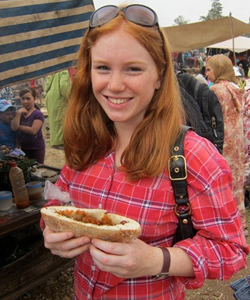
Gina Elliott
Gina Elliott (SFS'13) graduated from the School of Foreign Service in 2013. Originally from Bronxville, New York, she participated in the Junior Year Abroad Network from London, England during the spring of 2012.
I feel that the majority of Americans take for granted the idea that the United States is a country of immigrants. After all, we are still a relatively new country, and even people whose families have been in America for hundreds of years can often recount their European heritage. While the United Kingdom has an even longer history of immigration, studying the subject from a British perspective has drawn me to the realization that the “melting pot” is a relatively new, and sometimes challenged, idea in Britain. Furthermore, conversations with my classmates at SOAS have led me to question the melting pot paradigm in America as well, and to reconsider several ideas that I had simply assumed beforehand.
I am a lover of foods of all kinds, and I think that the best way to discover a country is to eat your way around it. I should probably be grateful that London is too expensive for me to spend all day eating! So naturally, one of the first things I noticed about London was the fact that there’s a South Asian or halal restaurant on almost every corner. Around where I’m living, these are places where you would pick up a midnight snack.
In 2001, the British foreign minister proclaimed chicken tikka masala a “national dish,” which reminds me of the ubiquity of white Chinese take-out containers in America. There may be a Chinatown in London, but it is nothing compared to the long string of South Asian restaurants and stalls that cover Brick Lane. As I’ve discussed British multiculturalism in my classes, however, I have come to realize that this abundance of Asian restaurants may belie serious problems that need to be addressed. I have also started to question whether Americans are too quick to brush similar problems under the carpet.
First of all, what is the image of a “melting pot” supposed to signify? Is it the idea of different cultures melting together while retaining their distinctiveness? Or is it new cultures simply acquiescing to the American or British one, essentially leaving behind much of what makes them unique? To put it another way, is the British love for curry a sign of its acceptance of South Asian culture, or is it the only part of their culture that South Asians have been able to keep in the public sphere?
My class discussions have largely lambasted “multiculturalism” as political rhetoric that has little real impact: we are told by society that we must accept difference and embrace “diversity,” so that’s what we do, at least ostensibly. But do we put any real effort into learning about and understanding other cultures that are melting with ours? There is a sense that that the entire concept of “multiculturalism” oversimplifies very complicated issues.
On the other hand, I think there are a lot of reasons for optimism in Britain. Discussions that force us to consider difference are useful in and of themselves, and they have largely been absent in American discourse in my experience. SOAS is one of the most diverse environments I have ever experienced, and it’s encouraging to see that people from all over the world, and from very different British backgrounds, are candidly discussing these issues.
Perhaps London is not representative of all of Britain, but every day I am witnessing conviviality between people from very diverse backgrounds. My experience in SOAS classrooms has taught me to more critically examine what I see and hear about multiculturalism. This, however, has not diminished my sense that London is a city that embraces many cultures and manages to be better in the process.